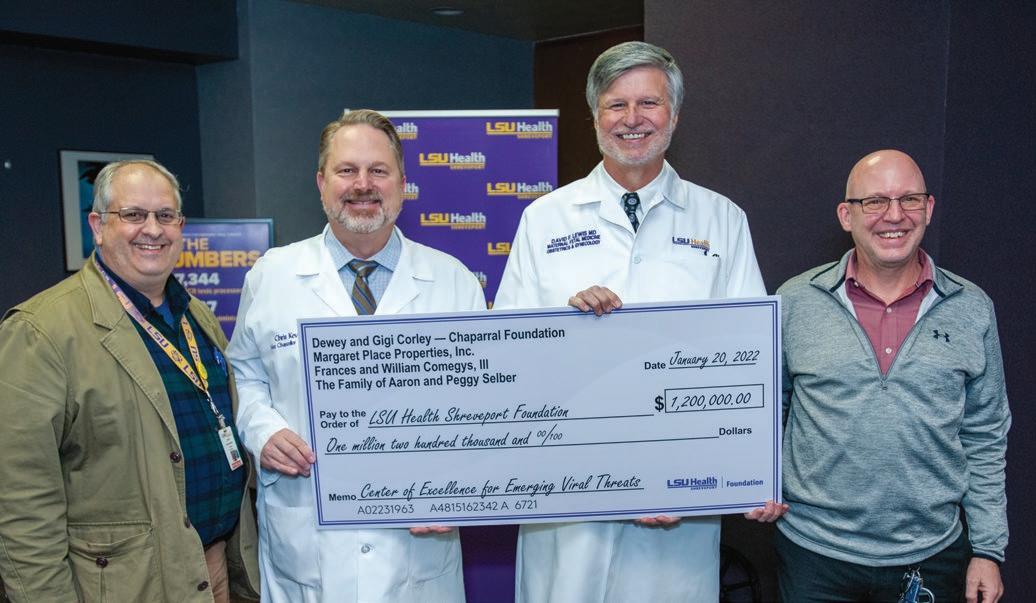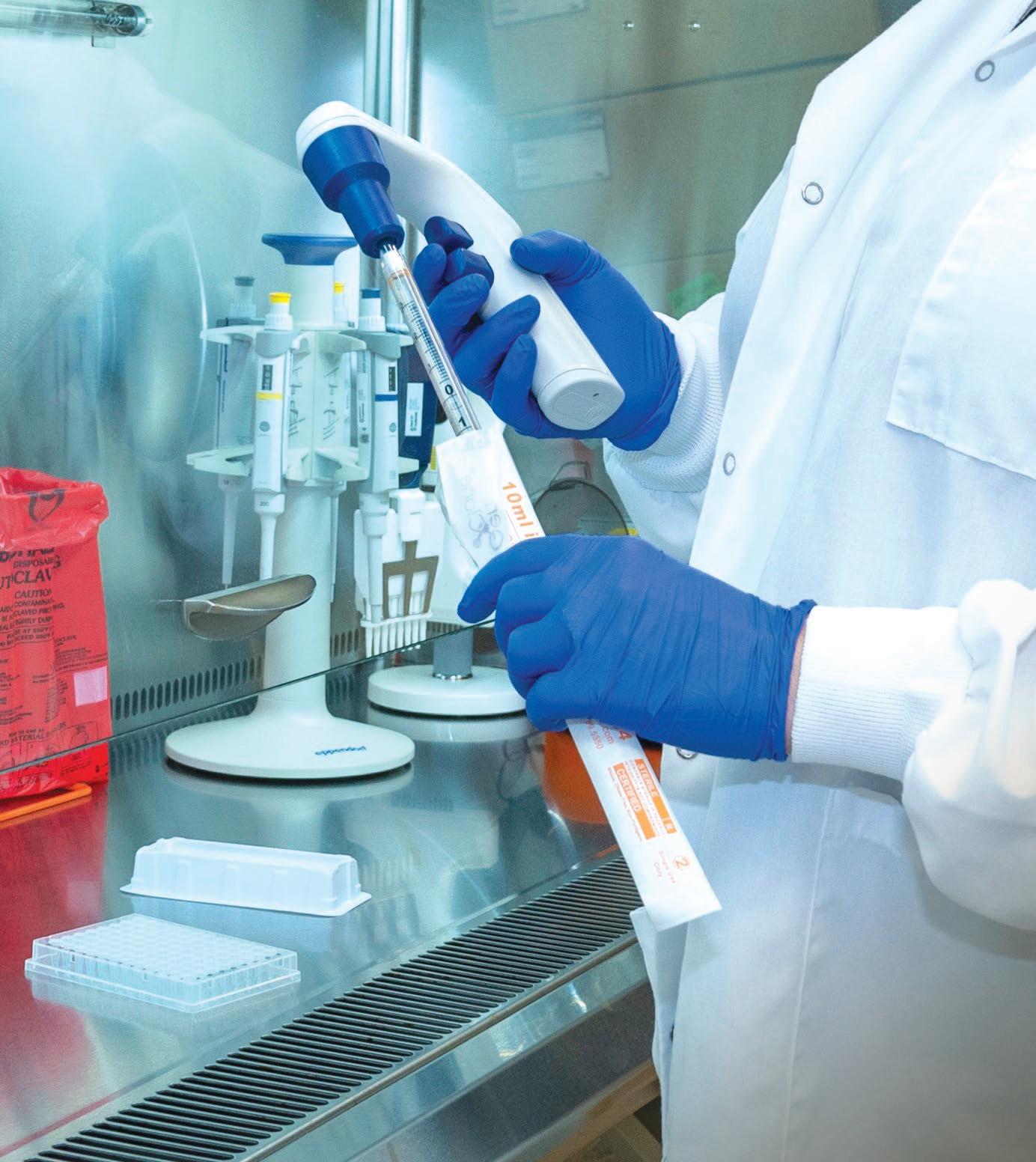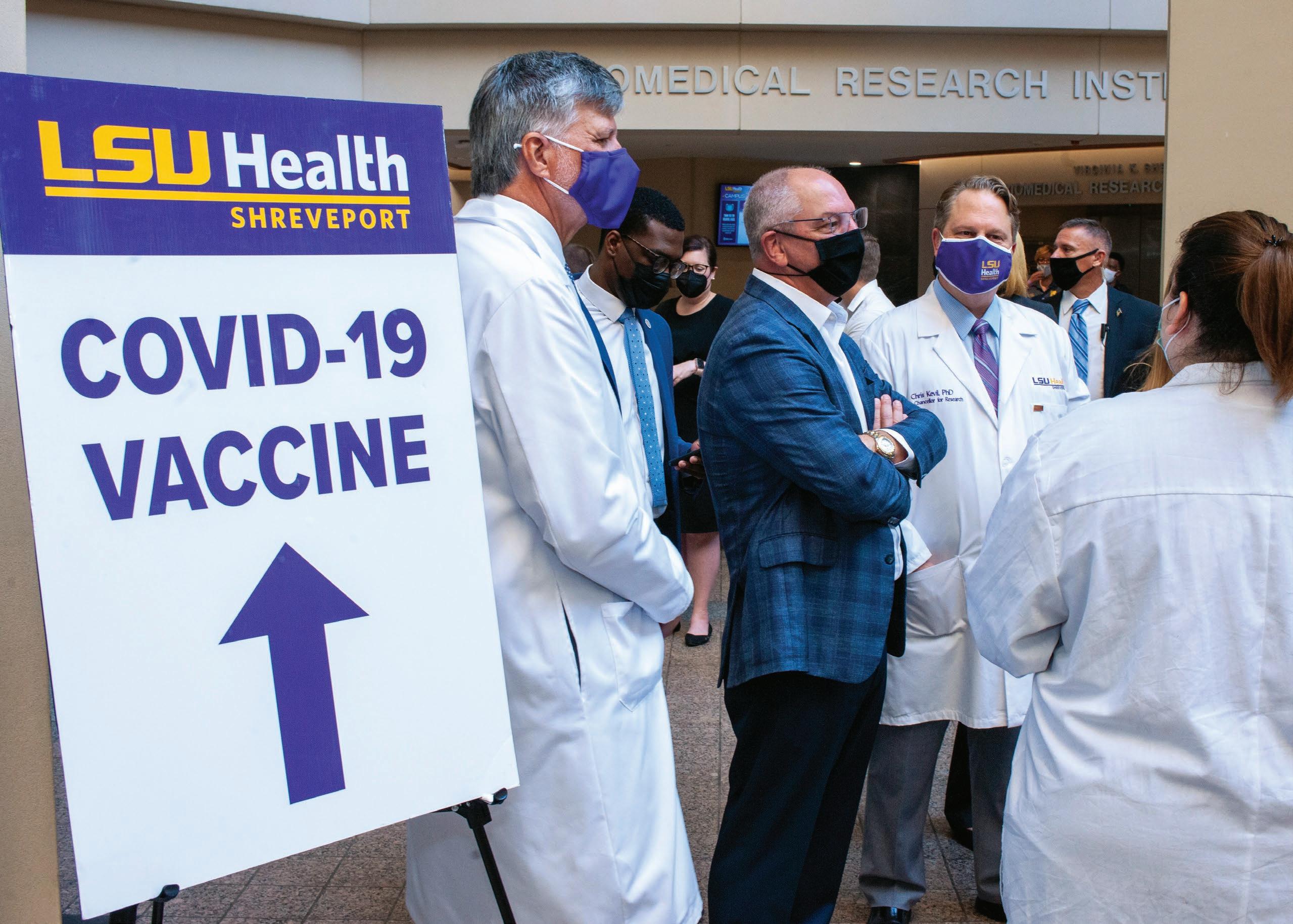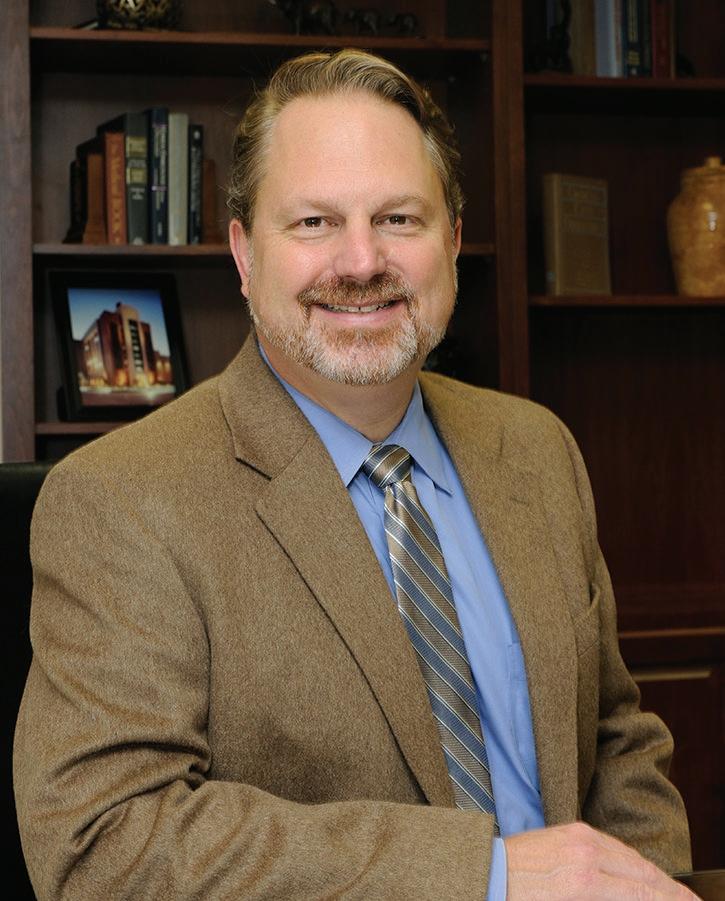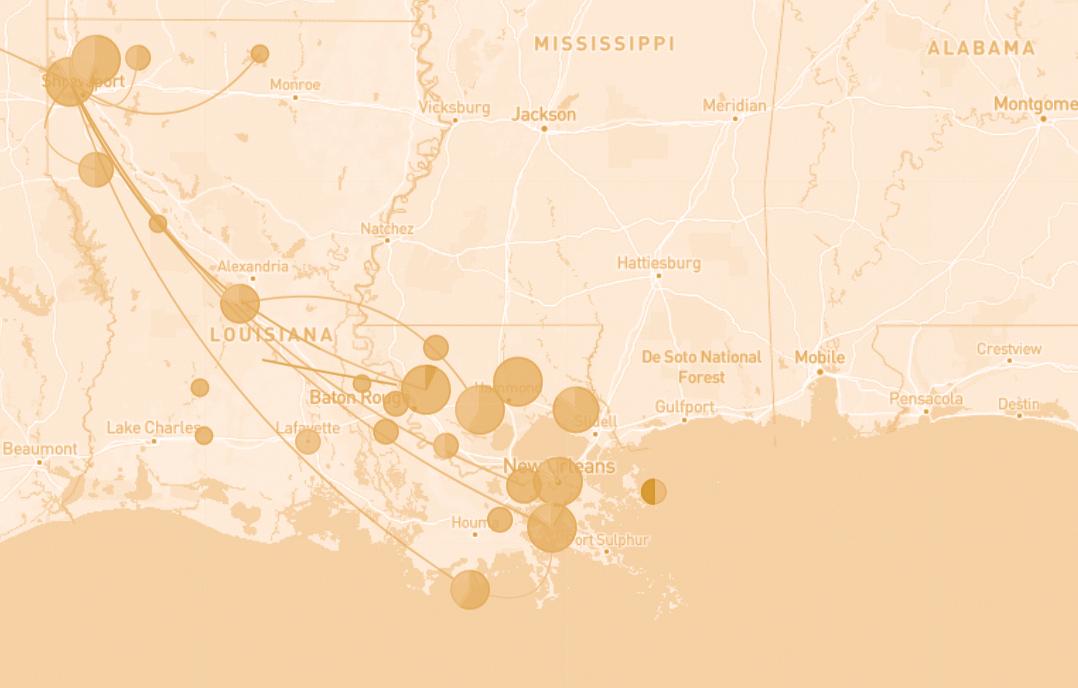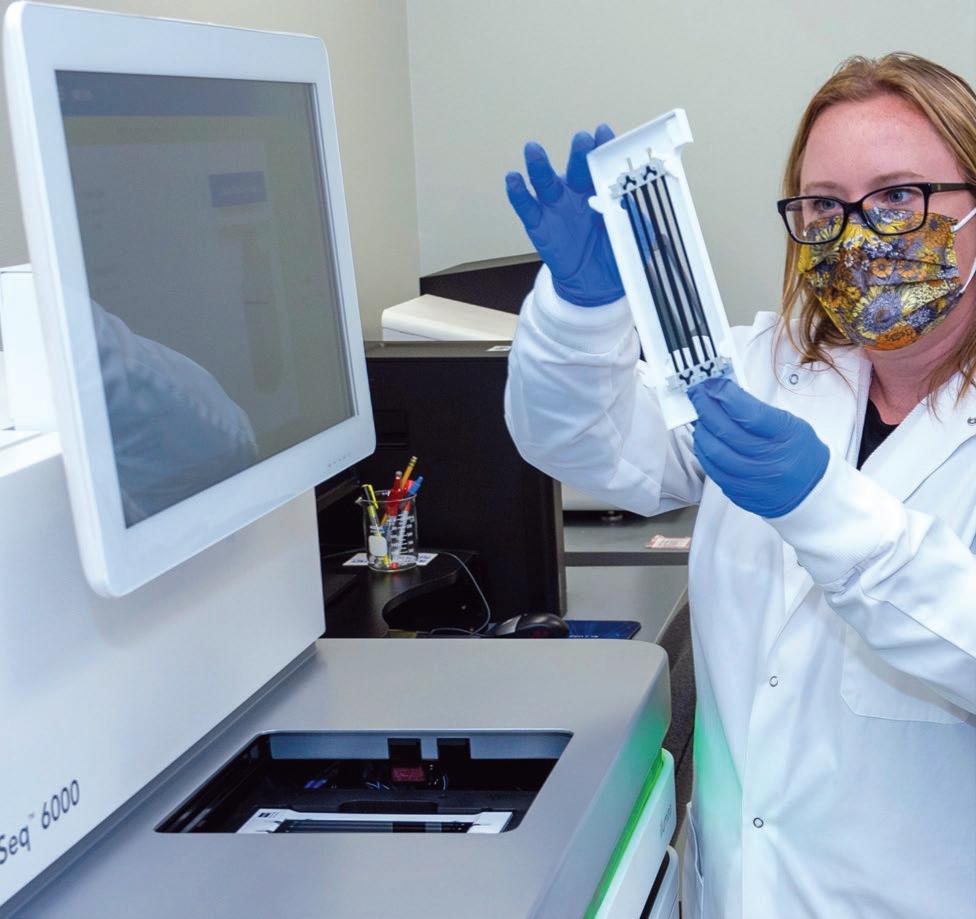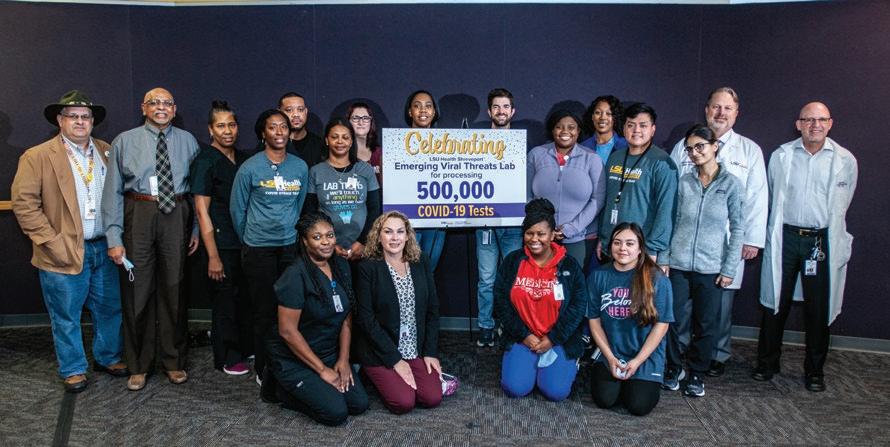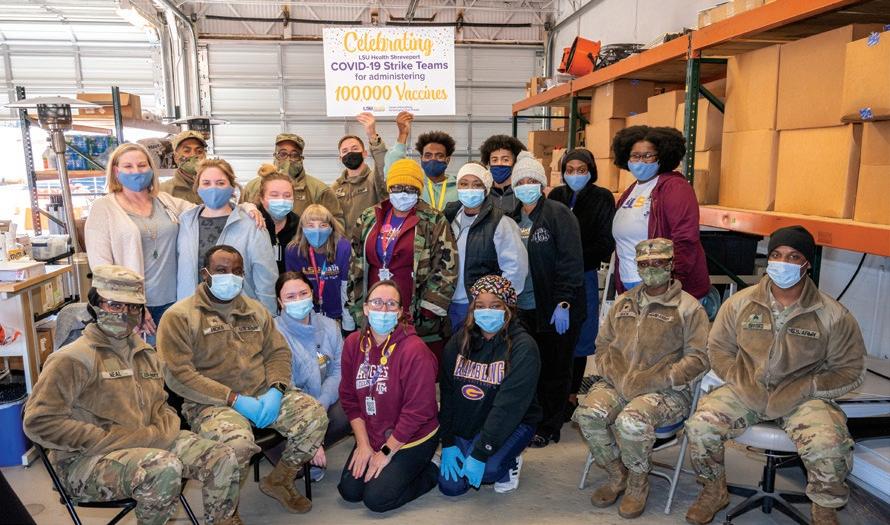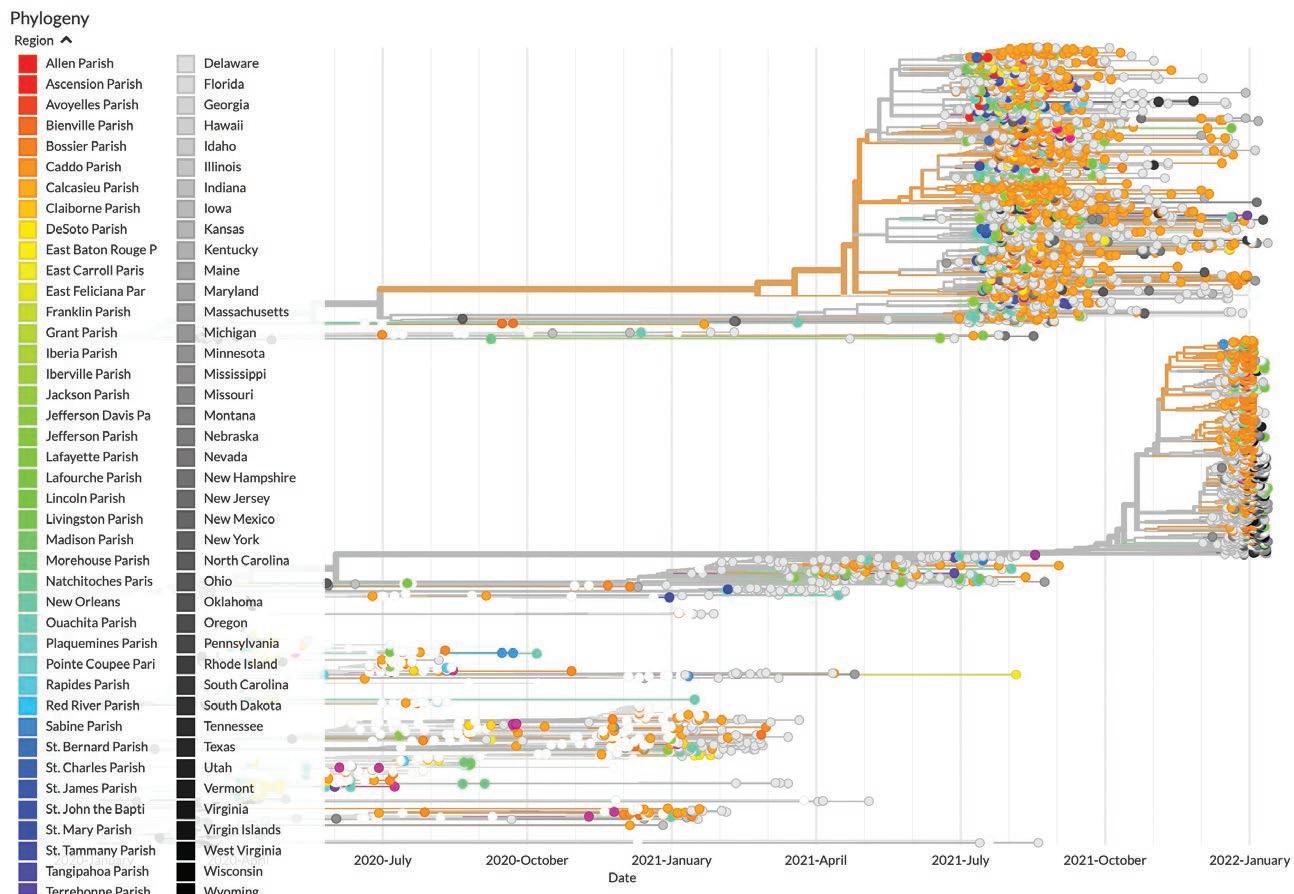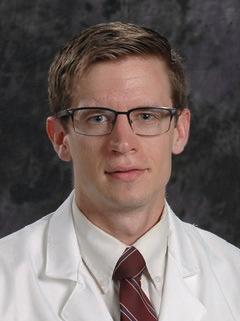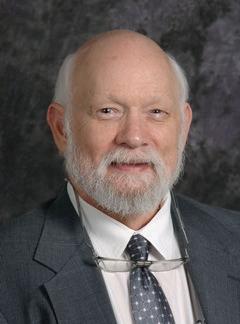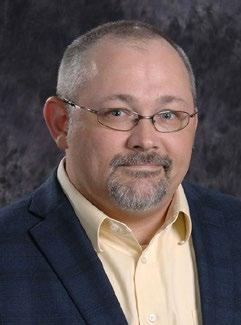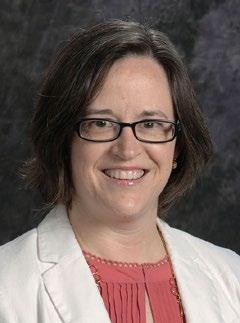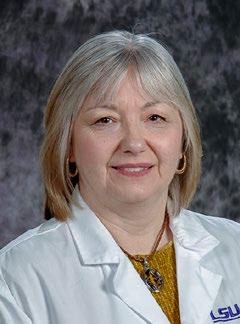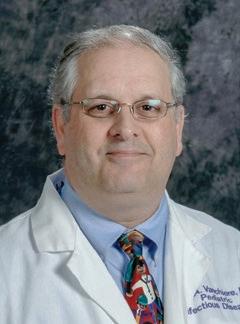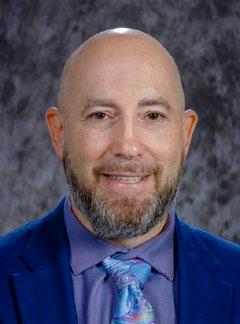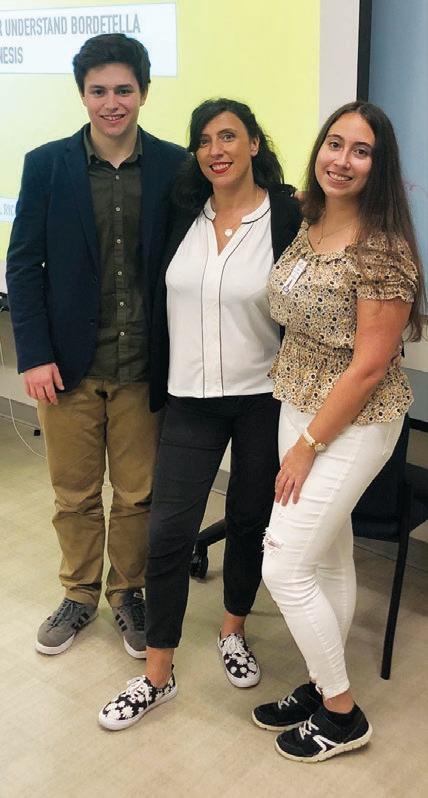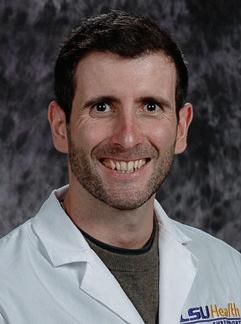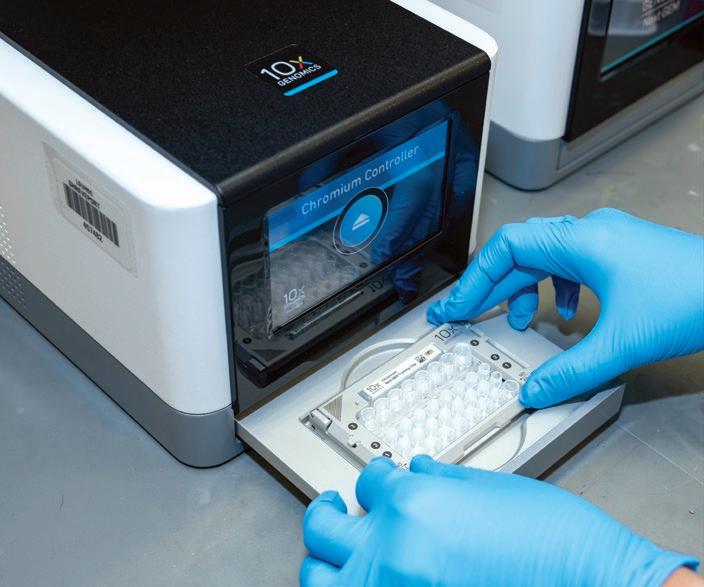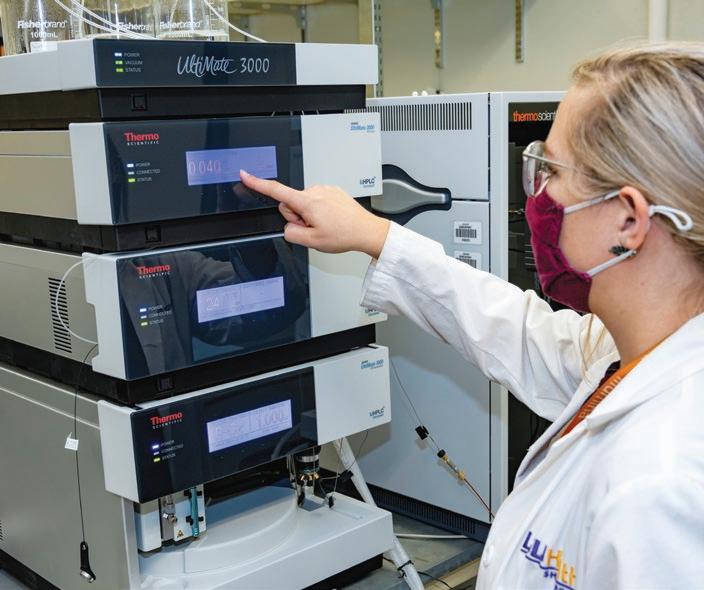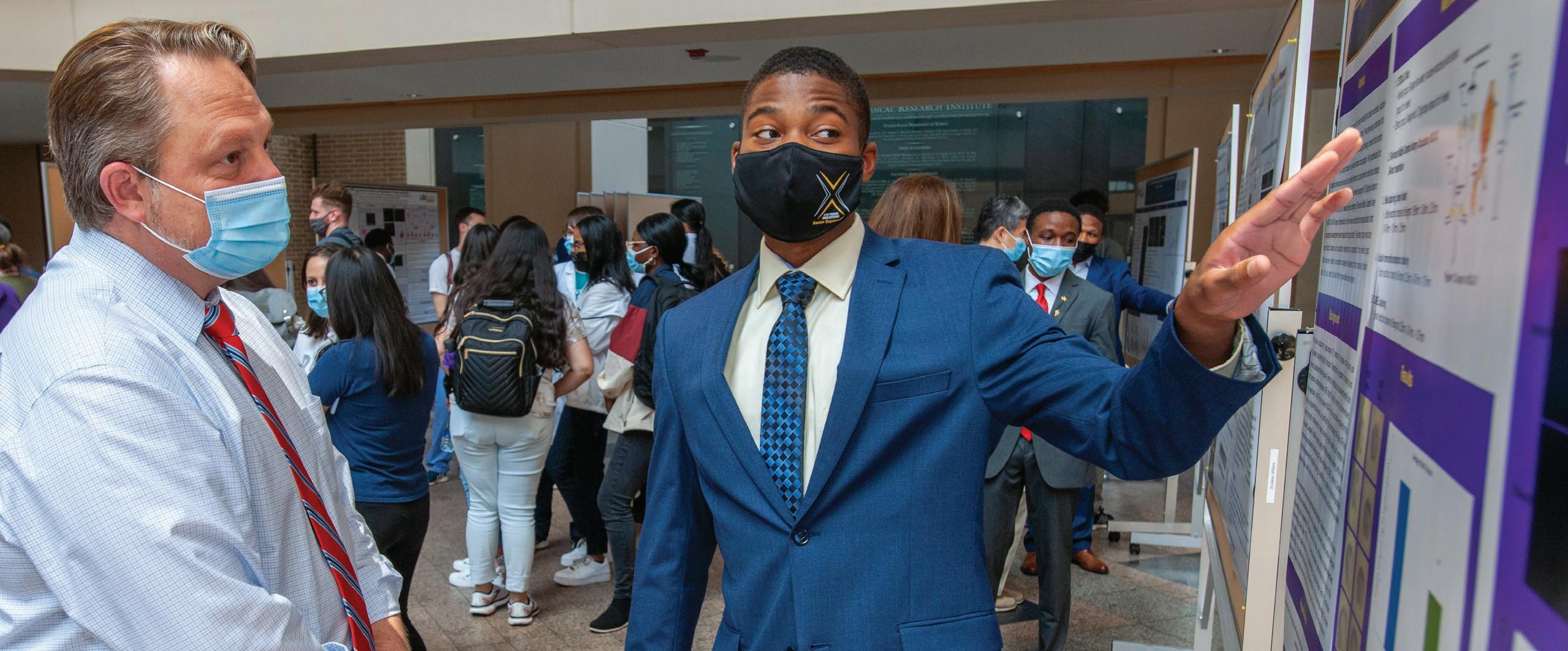From the Vice Chancellor for Research
Chris Kevil, PhD
Vice Chancellor for Research Dean, School of Graduate Studies Director/Principal Investigator, Center for Redox Biology and Cardiovascular Disease COBRE
As the COVID-19 pandemic continues to impact the globe, so does the research and work taking place at LSU Health Shreveport. Our outstanding team of scientists, physicians, staff, and leadership remain committed to utilizing the resources and expertise we are so fortunate to have here at LSUHS in response to this public health emergency. Thanks to their tireless efforts, the Center of Excellence for Emerging Viral Threats continues to be a leader in our state for testing, vaccinations, and genomic sequencing. Weekly COVID-19 testing by our Strike Teams has directly benefitted the community during the latest Omicron outbreak. Since March 2020 the CEVT has processed more than 500,000 COVID-19 test samples, sequenced more than 10,000 SARS-CoV-2 genomes, and administered more than 100,000 vaccines. We also continue to work closely with our colleagues and partners locally, nationally, and internationally to contribute to the global effort to track and learn more about the SARS-CoV-2 virus and develop plans on how to effectively respond to future pandemics. The important work of this center has not gone unnoticed, and I am pleased to share that the CEVT has received generous gifts totaling $1.7 million to support their mission. I extend a heartfelt thank you to Dewey and Gigi Corley and their Chaparral Foundation, Margaret Place Properties, Inc., Frances and William Comegys, III, and the Family of Aaron and Peggy Selber, who committed a combined $1.2 million to establish the first endowment for the CEVT, and Roy O. Martin III and Kathy Kilpatrick Martin, together with RoyOMartin, for their $500,000 gift to establish The Kathy and Roy O. Martin III CEVT Training Lab, which will be housed in the new Center for Medical Education building.
The Office of Research concluded the 2020-2021 fiscal year with a total of 183 grant submissions, 32 invention disclosures, 9 patents issued – 8 U.S. and 1 international – and $18.8 million awarded in grant funding, a 326% increase in grant funding over the last six years. Our team has also grown, and it has been a pleasure to welcome many new world-class researchers to our faculty. I look forward to sharing with you our continued growth in revealing novel ways to solve disease and pertinent public health needs of our community, state, and country.
I hope you enjoy this latest issue of Inside Research. You can find more stories about the research happening at LSU Health Shreveport throughout the year on our website at lsuhs.edu/research/news and on Facebook and Twitter by following us @LSUHSResearch.
Sincerely,
Chris Kevil, PhD Vice Chancellor for Research
CENTER OF EXCELLENCE FOR EMERGING VIRAL THREATS EXPANDS COVID-19 VIRAL GENOME SEQUENCING EFFORTS & REACHES MAJOR MILESTONES
Since the establishment of the Center of Excellence for Emerging Viral Threats (CEVT) in the earliest days of the COVID-19 pandemic its mission has been to serve the citizens of the state of Louisiana by addressing public health needs related to viral infections and disease, including detection and genomic surveillance for current and future viral threats.
Genomic sequencing and surveillance are a critical aspect of the worldwide fight against the COVID-19 pandemic. It is also a collaborative effort of scientists and organizations around the globe working to sequence and analyze SARS-CoV-2 genomes, then sharing that information to better understand this virus and track its spread.
Scientists at LSU Health Shreveport in CEVT’s Viral Genomics and Sequencing Lab have been sequencing SARS-CoV-2 genomes since April 2020 and their work is a leading contributor to state, national and international databases for COVID-19 surveillance. LSUHS works closely with the Louisiana Department of Health to provide data that has influenced positive public health outcomes around the state, particularly in North and Central Louisiana among vulnerable populations, shares sequencing data with CDC SPHERES, the national genomics consortium to coordinate SARS-CoV-2 sequencing across the U.S., and contributes to international databases like the Global Initiative on Sharing All Influenza Data (GISAID). GISAID enables open access to and rapid sharing of epidemic and pandemic virus data and has fostered collaboration around the world to build one of the largest SARS-CoV-2 sequencing databases. LSU Health Shreveport regularly uploads sequences as they are ready to the GISAID database, which reached a major global milestone recently when the five millionth SARS-CoV-2 sequence was submitted on November 9 by the CEVT.

SUPPORT FOR SEQUENCING
LSU Health Shreveport has received two grants totaling over $1 million to support the CEVT’s genomic sequencing efforts.
In May, Dr. Chris Kevil, Vice Chancellor for Research and Principal Investigator for the Center for Redox Biology and Cardiovascular Disease CoBRE at LSUHS, was awarded a $730,000 supplemental grant to his CoBRE from the National Institutes of Health (NIH) to enhance SARS-CoV-2 viral genomic sequencing surveillance in North Louisiana.
“Genomic surveillance has always been a part of our mission for the CEVT. Our goal with this funding is to further enhance our genomic surveillance of the SARS-CoV-2 virus in Louisiana, East Texas and Southern Arkansas, and expedite the identification of variants of the virus, which is imperative to protecting vulnerable populations and creating optimal public health outcomes,” said Kevil. “It is incumbent upon academic medical centers to advance research regarding this virus.”
This award represents strong collaboration between two NIH Centers of Biomedical Research Excellence (CoBREs) at LSUHS - the Center for Redox Biology and Cardiovascular Disease (CRBCD) led by Dr. Kevil and the Center for Applied Immunology and Pathological Processes (CAIPP) led by Dr. Andrew Yurochko - which will continue to work together and utilize established institutional programs like the CEVT to support advancing this sequencing research projects.
In June, The Rockefeller Foundation also announced over $20 million in funding and several non-financial collaborations to help strengthen global genomic sequencing and data sharing capacity. These collaborations shape The Rockefeller Foundation’s Pandemic Prevention Institute, which aims to help the world detect, prevent, and mitigate pandemic threats to achieve containment as quickly as possible.
LSUHS CEVT and Associate Professor of Microbiology and Immunology Dr. Jeremy Kamil were named one of
four Rockefeller Foundation’s “U.S. Regional Accelerators for Genomic Surveillance” and was awarded a $340,000 grant to support the establishment of a regional genomic surveillance network to increase the volume and diversity of samples sequenced so that genomic epidemiology can better inform medical and public health counter measures in response to a future pandemic. The Rockefeller’s Regional Accelerators for Genomic Surveillance also includes the Broad Institute of MIT and Harvard, the University of Florida, and the University of WisconsinMadison, that together provide strategic coordination and operational support towards improved and diversified regional surveillance efforts.
This grant award was made possible through LSU Health Shreveport’s partnership with Louisiana Tech University and Grambling State University. With the support provided by the Rockefeller grant, Grambling State University has begun sequencing SARS-CoV-2 samples on campus and submit those sequences to GISAID. Louisiana Tech University has been instrumental in outreach to health clinics and getting them enrolled in the project. LSU Health Shreveport’s data team has created data visualization tools as well as a dashboard for the Rockefeller support sequencing efforts that helps all researchers across the various campuses see how the project is going.
“As the virus evolves, we have to ensure that vaccines, our best tools for stopping it and its deadly toll on individuals, families and communities, remain effective,” said Dr. Rick Bright, Senior Vice President of Pandemic Preparedness at The Rockefeller Foundation. “Rapidly sharing genomic sequencing information from all corners of the globe enables us to see and understand how the virus is changing and adapt our tools accordingly. Without this information we risk the pandemic continuing to wreak havoc on our lives.”
MAJOR MILESTONES for the Center of Excellence for Emerging Viral Threats
LSU Health Shreveport’s COVID-19 Strike Team have administered more than 100,000 COVID-19 vaccine since January 2021.
Over 175 individuals have been a part of the LSUHS vaccine teams comprised of physicians, nurses, nursing, medical and allied health students, and the Louisiana National Guard. These individuals have provided vaccines at over 100 locations throughout north Louisiana.
The Emerging Viral Threats (EVT) Lab at LSU Health Shreveport has processed more than 500,000 COVID-19 PCR tests. Testing is an essential component in preventing the spread of COVID-19.
PCR (polymerase chain reaction) tests are a type of molecular test that analyzes a sample for the presence or absence of genetical material, or RNA, of SARS-CoV-2, the virus that causes COVID- 19. Since it’s authorization in February of 2020, the PCR test has been considered the “gold standard” diagnostic test for COVID-19 because of its high accuracy.
The entire CEVT team has remained dedicated and worked diligently to protect Louisiana citizens since the earliest days of the pandemic. Since it first began processing COVID-19 tests in March 2020, the EVT Lab has only continued to grow in its capabilities. In addition to testing more than 500,000 Louisiana citizens for the presence or absence of an active SARS-CoV-2 infection via PCR tests, nearly 18,000 antigen tests have been conducted to rapidly detect for presence of the virus and more than 4,600 serology tests have been run, which test for the presence of antibodies to the virus.
On Sunday, January 16, the Center of Excellence for Emerging Viral Threats’ (CEVT) Viral Genomics and Surveillance Lab uploaded its 10,000th sequence to GISAID (Global Initiative on Sharing Influenza Data). The LSU Health Shreveport CEVT Sequencing Lab has worked tirelessly sequencing and tracking variants of SAR-CoV-2, the virus that causes the COVID-19 disease. The uploaded sequences from samples collected in early January were nearly all Omicron variant, the dominant variant in the U.S. attributed to the recent surge of COVID-19 cases.
The CEVT Sequencing Lab continues to be the top submitter of SARS-CoV-2 data from Louisiana to online repositories and is now looking at technologies to further increase the speed at which sequence is generated and shared. Rapid data sharing from around the globe during the COVID-19 pandemic has been through the use of the GISAID database, which now contains more than 7 million SARS-CoV-2 sequences.
The CEVT gratefully acknowledges the work of many individuals including: Greg Ware, Adrian Almodovar, Dr. Jennifer Carroll, Camille Abshire, Dr. Byeong-Jae Lee, Dr. Seong Kim, Dr. Malgorzata BienkowskaHaba, Dr. Kasia Zwolinska, Jarrod Sawyer, Maarten van Diest, Britt Grunsfeld, Kenny Densmore, Lori Atkins, April Johnson, Dr. Alex Mijalis, Dr. Martin Sapp, Dr. Rona Scott, Dr. Andrew Yurochko, Dr. Jeremy Kamil, Dr. John Vanchiere, Dr. Chris Kevil, Dr. Joseph Bocchini, the Emerging Viral Threats Lab and the CEVT COVID-19 Strike Teams.
The following partnerships have also been instrumental in supporting genomic sequencing efforts at LSUHS: The Rockefeller Foundation, Louisiana Tech University, Grambling State University, the NIHfunded COBRE Center for Redox Biology and Cardiovascular Disease at LSUHS, Louisiana Department of Health, Ochsner LSU Health Shreveport, Willis-Knighton Health System, Our Lady of the Lake Baton Rouge, and free and charitable community health clinics.
PHYLODYNAMIC ANALYSIS OF LOUISIANA SARS-COV-2 Outbreak
CENTER OF EXCELLENCE FOR EMERGING VIRAL THREATS
Phylogenetic analyses are used to place SARS-CoV-2 coronavirus genomes on a “family tree,” and are generated using powerful software designed by genetic epidemiologists. The resulting trees enable scientists and curious members of the public to interact with viral genetic sequence information to infer possible transmission chains and to visualize the relatedness of various SARSCoV-2 coronavirus genomes from around the state. The raw data were generated by determining the sequence of viral RNA genomes recovered from patient samples. The organizations that contributed viral sequence data from Louisiana were the LSU Health Shreveport Emerging Viral Threats Laboratory, Microbial Genome Sequencing (MiGS) Center, Garry Lab (Tulane University), Andersen Lab (Scripps Research), BioInfo Experts, LSU Baton Rouge, Gingko Bioworks, Louisiana Department of Public Health, and the CDC. Once sequence data is generated, it is uploaded to GISAID, a science initiative for epidemics/ pandemics that has become a key resource for international collaboration efforts to combat COVID-19 and influenza.
564,603 COVID-19 PCR tests processed
119,570 COVID-19 vaccines administered
11,498 SARS-CoV-2 genomes sequenced Representing >50% of all genomic sequencing in Louisiana
NIH/NIGMS Ruth L. Kirschstein
Individual Predoctoral NRSA Fellowship
MD-PhD student Ryan Mackay was awarded a F30 Ruth L. Kirschstein Individual Predoctoral National Research Service Award Fellowship from the NIH for his project entitled, “Investigating a novel role for Top2a in R-loop resolution and in YM155 mechanism of action.” The Kirschstein-NRSA Individual Predoctoral MD/PhD NIH award contributes to efforts to increase the pool of highly trained physician/scientists in the biomedical research workforce by supporting highly promising predoctoral students, who are enrolled in a combined MD/PhD or other dual-doctoral degree training program during their mentored dissertation research training and clinical training under the guidance of outstanding faculty sponsors. Ryan is in Dr. Christopher Patillo’s Lab in the Department of Molecular and Cellular Physiology, and the first student at LSU Health Shreveport to receive this prestigious fellowship.
Dr. Goeders Appointed to JanOne Scientific Advisory Board
Nicholas E. Goeders, PhD, Professor and Chair of the Department of Pharmacology, Toxicology, and Neuroscience, was appointed to JanOne Inc.’s Scientific Advisory Board (SAB). JanOne Inc. is a company focused on developing treatments for conditions that cause severe pain and drugs with nonaddictive, pain-relieving properties. Dr. Goeders is the Executive Director of the Louisiana Addiction Research Center at LSUHS and is considered one of the world’s leaders on the role of stress in drug addiction.
“I am delighted to be able to contribute my knowledge to the very important work JanOne is doing to reduce risk associated with opioid addiction and overdose,” said Dr. Goeders. “Peripheral artery disease (PAD) associated pain can be severe, and nearly 25% of all those with PAD are at risk for addiction when being prescribed opioids to treat chronic neuropathic pain. I look forward to working with the talented team at JanOne and alongside the distinguished members of its SAB on the Company’s fight against opioid addiction.”
NIH/NHLBI Ruth L. Kirschstein
Institutional National Research Service Award
A. Wayne Orr, PhD, Director of the Center for Cardiovascular Diseases and Sciences, and Karen Stokes, PhD, Assistant Director of Scientific Excellence for the Center for Cardiovascular Diseases and Sciences, are Co-Principal Investigators on a new T32 Ruth L. Kirschstein Institutional National Research Service Award from the NIH to establish the Multidisciplinary Training in Cardiovascular Pathophysiology (MTCP) Training Program at LSU Health Shreveport. The purpose of this KirschsteinNRSA training program is to enable institutions to recruit individuals selected by them for predoctoral and postdoctoral research training in specified shortage areas. The goal of this program is to prepare qualified predoctoral and/or postdoctoral trainees for careers that have a significant impact on the healthrelated research needs of the nation. The goal of the MTCP Training Program at LSUHS is to establish a research program to meet the need for advanced interdisciplinary training for Predoctoral Fellows and to provide a diverse pool of scientists to the study of cardiovascular disease.

NIH Grant Further Supports Parkinson’s Disease Research
Stephan Witt, PhD, Chair and Professor of Biochemistry and Molecular Biology, has been awarded a multi-Principal Investigator one-year R56 grant for $642,408 from the NIH’s National Institute of Neurological Disorders and Stroke (NINDS). Dr. Witt is the Principal Investigator at LSU Health Shreveport and is collaborating with Dr. Joseph Mazzulli, the Principal Investigator at Northwestern University Feinberg School of Medicine. Dr. Witt and Dr. Mazzulli’s grant is titled “Examining the role of phosphatidylethanolamine and autophagic disruption in Lewy body dementias and Parkinson’s disease.” The research is based on a finding by the Witt Lab that supplemental ethanolamine promotes efficient intracellular trafficking of the Parkinson’s diseaseassociated protein, a-synuclein.
NASA Selects LSUHS Researcher’s Project Proposal to Support Future
Research in Space
The research of Lynn Harrison, PhD, Professor of Molecular and Cellular Physiology, was recently selected by NASA’s Space Biology Program as one of three space biology proposals to prepare for future research on the surface of the moon. Only a few biological experiments have been conducted beyond Low Earth Orbit (LEO), meaning the biological effects of conditions beyond LEO are still poorly understood. Dr. Harrison’s research project, “Investigating Lunar Stress and Parkinson’s Disease using an Alpha Synuclein Yeast Model,” along with the two other projects selected, seek to widen NASA’s understanding of biological responses beyond LEO by preparing experiments in which yeast, a eukaryotic microorganism, will be grown and monitored on the lunar surface utilizing the BioSensor hardware. The three selected investigators will work with a team of NASA engineers for hardware integration and testing from 2022-2025 utilizing $900,000 in grant funding.

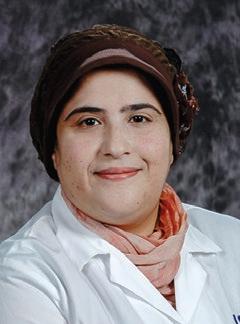
American Heart Association Career Development Awards
Two Center for Cardiovascular Diseases and Sciences (CCDS) postdoctoral fellows were awarded American Heart Association (AHA) Career Development Awards. This prestigious award supports highly promising healthcare and academic professionals in the early years of their career by funding innovative research and training to assure the future success of awardees as independent scientists. The total AHA Career Development Award amount is $231,000 over a funding duration of three years. Celeste Y.C. Wu, PhD, is a previous CCDS Fellow and now an Assistant Professor of Research in Neurology at LSUHS. Her Career Development Award will support her research project exploring the role of enzyme catalysts in age-induced vascular dementia. Mabruka Alfaidi, PhD, a current CCDS Fellow and Postdoctoral Fellow in Pathology, has been selected as a recipient of an American Heart Association Career Development Award. During the duration of her AHA Career Development Award, Dr. Alfaidi will complete her postdoctoral fellowship, which is also supported by the American Heart Association, and transition to a tenure track faculty position. She plans to continue studying the mechanism by which heart disease is developed, particularly heart attacks, with a goal of creating a small molecule inhibitor that can prevent endothelial dysfunction from inside endothelial cells. Achieving this goal holds tremendous promise in the treatment and possible prevention of heart attacks.

LSU Health Shreveport Collaborating on $2.6 Million NIH Grant to Study Childhood Epilepsy
The collaborative extramural research brings together experts from LSU Health Shreveport, Emory University, Mercer University and Morehouse School of Medicine. The research project entitled, “Exploring the Role of Oxytocin in the Regulation of Neuronal Excitability,” is focused on a form of catastrophic childhood epilepsy called Dravet syndrome. Kevin Murnane, PhD, Associate Professor of Pharmacology, Toxicology and Neuroscience; Associate Professor of Psychiatry; and Director of Basic Science Research for Louisiana Addiction Research Center (LARC), is the Principal Investigator at LSU Health Shreveport. During this research project, scientists will examine whether oxytocin can curb spontaneous seizures, behavioral abnormalities, and neuronal hyperexcitability. The longterm goals are to better understand the mechanisms by which neuropeptides regulate neuronal excitability, and to develop safe and effective approaches for the brain delivery of neuropeptides for the treatment of epilepsy and other brain disorders.
LSU Health Shreveport Awarded LDH Contract for COVID-19 Testing in K-12 Schools for 2021-22 School Year
LSU Health Shreveport was awarded one of three contracts in Louisiana to deliver COVID-19 testing in kindergarten through twelfth grade (K-12) schools in Public Health Regions 5, 6, 7 and 8 for the 2021-2022 school year. LSUHS is the only academic medical center to receive a K-12 testing contract. The agreement is in partnership with the Louisiana Department of Education (LDOE) and the Louisiana Department of Health (LDH) with funding provided by the Centers for Disease Control and Prevention (CDC). Regular COVID-19 testing in schools can help reduce community spread and keep schools open, help ensure equitable access, and increases confidence in schools’ plans to return to in-person learning and student’s safety. Experienced testing personnel from the Center for Emerging Viral Threats’ (CEVT) COVID-19 Strike Teams coordinate and complete weekly testing for schools in the 34 parishes that comprise Regions 5, 6, 7 and 8 that choose to participate in the program. Test samples are then processed by the EVT Lab at LSUHS with results sent to parents typically within 24 hours. LSUHS COVID-19 Strike Teams currently oversee the weekly testing of more than 6,200 students from 115 schools across Regions 5, 6, 7 and 8 that are enrolled in the K-12 COVID-19 Testing Program.

I got the
Clinical Trials Office Names New Directors
Erin Yates, RN, BSN, has been selected as the Director of the Clinical Trials Office (CTO). As Director, she works closely with the CTO Medical Director, Dr. John Vanchiere, to manage the department and assists in determining the feasibility of proposed clinical trials, allocating the workload of the regulatory team and clinical research coordinators. She is responsible for reviewing federal and state laws, regulations, institutional polices, and guidelines used to provide guidance to faculty, Principal Investigators, and research staff to ensure institutional compliance of human subject laws. Erin spent 15 years as a Neonatal Intensive Care Unit nurse before joining the Clinical Trials Office at LSU Health Shreveport in 2019 as a Registered Nurse and the Clinical Research Coordinator for the Children’s Clinical Research Center.
John A. Vanchiere, MD, PhD, has been selected to serve as the Medical Director for the Clinical Trials Office at LSU Health Shreveport. As a physician and scientist, Dr. Vanchiere has dedicated his career to not only treating patients, but also researching diseases and potential treatments. He brings a wealth of knowledge and experience to the position having led many research initiatives and serving as the principal investigator on numerous clinical trials, most recently the Pfizer-sponsored COVID-19 vaccine study site in Shreveport. In his new role as Medical Director, Dr. Vanchiere will provide medical support for all clinical trials conducted by LSU Health Shreveport. He will be instrumental in the design and implementation of investigator-initiated clinical trials, determining feasibility of proposed clinical trials and ensuring that clinical trials are in accordance with federal, state, or local laws, and provide input in all federal and state audits of clinical research.
Office of Research Welcomes New Chief Innovation Officer
Wayne Nix, MBA, was named the new Chief Innovation Officer of Research at LSU Health Shreveport. Mr. Nix is an experienced entrepreneur with over 20 years of experience in both healthcare and business development and management arenas. He has also led many team innovation strategies while providing mentorship for new entrepreneurs. In his role as Chief Innovation Officer, he will support the Office of Research in managing the innovation process at LSUHS by supporting the growth of existing technologies and collaborations, as well as recognizing and developing new innovative ideas and program opportunities.
Mr. Nix has a strong education and career background in healthcare, leadership and innovation. After serving for six years with the Louisiana Army National Guard, he earned his associate degree in Respiratory Therapy and bachelor’s degree in Cardiopulmonary Technology from Nicholls State University, followed by an associate degree in Nursing from Our Lady of the Lake University. He also received his Master of Business Administration degree from the University of New Orleans. He also serves as a volunteer for the Department of Biomedical Science at LSU Shreveport, the Louisiana Startup Prize, and Louisiana Tech University’s TOP DOG New Venture program.
Dr. Ellen Friday Among First to Receive New Qualification in Biorepository Science Credential
Ellen Friday, PhD, Clinical Assistant Professor and Researcher at LSU Health Shreveport, has received her Qualification in Biorepository Science (QBRS) from the International Society for Biological and Environmental Repositories (ISBER). Dr. Friday is among the first 100 people globally to pass the QBRS exam and receive this credential, a distinction among biorepository science professionals. This new certification program for biorepository personnel was created by the ISBER and American Society for Clinical Pathology (ASCP) in 2020 to help meet the needs of all ISBER members and biorepository communities, and further advance biomedicine and biospecimen-based scientific discoveries. According to the ISBER, a global biobanking organization, biobanking is a growing field with increasing demand for related education and professional standards. Dr. Friday is also the Scientific Director for the Feist-Weiller Cancer Center’s Biorepository and the Technical Supervisor for the FWCC’s Center for Precision Medicine Genomics Laboratory.


Dr. Queen Named Director of Viral Genomics and Surveillance

Krista Queen, PhD, has been selected as the Director of Viral Genomics and Surveillance at LSU Health Shreveport effective September 1. Dr. Queen received her Bachelor of Science in Biological Sciences from LSU Shreveport and is an alumna of the LSUHS School of Graduate Studies. She completed her PhD in 2012 and went on to be a Postdoctoral Fellow in the Department of Microbiology and Immunology under the mentorship of Dr. Rona S. Scott. Following her postdoctoral fellowship, Dr. Queen was an ORISE Fellow for five years with the Pathogen Discovery and Detection Team in the Gastroenteritis and Respiratory Viruses Lab Branch of the National Center for Immunization and Respiratory Diseases (NCIRD)/Division of Viral Diseases (DVD) at the Centers for Disease Control and Prevention in Atlanta, Ga. She then continued her career at CDC as a Microbiologist with the Genomics and Discovery Team in the Respiratory Viruses Branch of DVD/ NCIRD.
Dr. Queen brings an extensive amount of knowledge and experience in genomic sequencing, data management, and biosafety to her new role at LSU Health Shreveport, where she will oversee sequencing activities for COVID-19, explore new partnerships for increasing sequencing activities and funding, and work with state and federal partners to enhance the sequencing program at LSUHS. Dr. Queen has been studying the virus that causes COVID-19, SARS-CoV-2, from the beginning of its discovery and was a member of the CDC’s COVID-19 Investigation Team from day one. She most recently worked with the U.S. Department of Health and Human Services Testing and Diagnostics Working Group where she worked on many projects, including setting up testing and vaccinations at the Lafayette Jockey Lot in Lafayette, La., and getting testing offered by federal partners at LSU Baton Rouge and a testing site in Shreveport.
Dr. Queen is also an associate member of the American Society for Virology, an associate editor for the Journal of Medical Virology and previously served on the Division of Viral Diseases Safety Committee, and as a Plain Language Ambassador for CDC’s National Center for Immunization and Respiratory Diseases.
FWCC Completes NCORP Audit Achievement
LSUHS COVID-19 Response Honored at An Evening for Healers
The LSU Health Sciences Foundation celebrated the 10th anniversary of LSU Health Shreveport’s signature fundraising event, An Evening for Healers, on Sept. 9. A fully vaccinated, masked, and socially distanced audience gathered to celebrate all that has been accomplished at our health sciences center over the last two years and look forward to its future. Three inspiring patient stories were shared and many first responders, physicians, nurses, and other healthcare professionals who work tirelessly each day to save lives were recognized, including LSU Health Shreveport’s COVID-19 response honorees from the Center of Excellence for Emerging Viral Threats.
TESTING LAB & VIRAL SEQUENCING
LaToya Brown — EVT Medical Technician
Jennifer Carroll, PhD — EVT Lab Director
Rona Scott, PhD — Associate Professor of Microbiology and Immunology/Viral Oncology
Jeremy Kamil, PhD — Associate Professor of Microbiology and Immunology, and Director of COVID Genomic Sequencing
CLINICAL & DEVICE TRIALS
Kim Hutchinson, RN, CCRN, CCRC — Emergency Medicine and Critical Care Clinical Research Coordinator
L. Keith Scott, MD, MSc, FCCM — Professor of Pediatrics, Surgery and Medicine
Pat F. Bass III, MD, MS, MPH — Professor of Medicine and Pediatrics, and Institutional Official Designee
Matt Woolard, PhD — Associate Professor of Microbiology and Immunology
J. Steven Alexander, PhD — Professor of Molecular and Cellular Physiology
COMMUNITY
COVID-19 STRIKE TEAMS
Michelle Raley, RN — Vaccine Coordinator
Anissa Gunn — Project Coordinator
Jennifer Burris — Outreach Program Coordinator
Quintin Knuckles — Logistics Coordinator
John Vanchiere, MD, PhD — Professor of Pediatrics and CEVT Director of Community Outreach for Testing and Vaccination
Congratulations to the Feist-Weiller Cancer Center Research Team! Their recent Gulf South Minority Underserved NCI Community Oncology Research Program (NCORP) audit by the ECOG-ACRIN Cancer Research Group was completed with zero major deficiencies and zero minor deficiencies found, which is a notable and rare achievement. Ten clinical trial protocols and a total of 31 regulatory, research pharmacy and patient case documents were audited over a four-day period in August. As an affiliate site of the Gulf South Minority Underserved NCI Community Oncology Research Program (NCORP), FeistWeiller Cancer Center clinical trials are subject to audits to ensure trials are conducted ethically and in accordance with NIH and NCI regulations and guidelines.
Center for Brain Health Collaborates with The Bridge Alzheimer’s Dementia and Resource Center
Two local leaders in the field of Alzheimer’s and dementia have joined together to create a convenient, central location where patients, their family members and caregivers can access education resources, support services and clinical trials. The Alzheimer’s Association reports that in Louisiana there are 92,000 people aged 65 and older living with Alzheimer’s, 204,000 family caregivers bear the burden of this disease, and 318 million hours of unpaid caregiving are estimated to be provided by caregivers. These statistics show the need for access to proper and impactful resources for people affected by Alzheimer’s and other dementias.
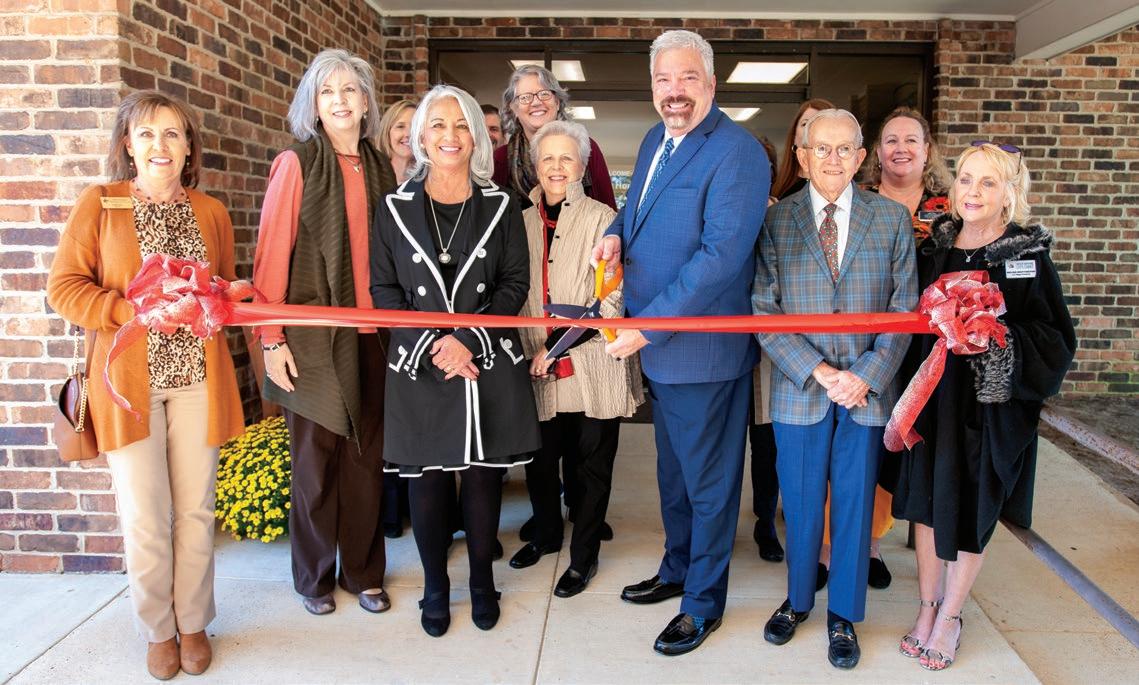
“Our organization has grown into a full-service center providing assessments, client coaching, dementia education, caregiver support groups, and outreach speaking,” stated Paulette Freeman, Executive Director of The Bridge Alzheimer’s & Dementia Resource Center. “We are thrilled to have a new home in the heart of Highland at 851 Olive Street and that the LSUHS Center for Brain Health is onsite with us, which gives us the opportunity to provide a comprehensive support system for those affected by dementia.”
“Our new ‘one-stop-shop’ is a game changer for patients, their families and caregivers. We are improving awareness and increasing access to clinical trials, which brings the latest available treatments, and virtual caregiver support to our community,” stated Elizabeth Disbrow, PhD, Director of the Center for Brain Health.
Department of Microbiology and Immunology Establishes Collaborative Agreement with Barrié Foundation to Offer Summer Research Program for Galician
Students
The Department of Microbiology and Immunology at LSU Health Shreveport has established a collaborative agreement with the Fundación Barrié (Barrié Foundation) based in La Coruna, Spain, a Galician cultural heritage foundation dedicated to improving the Spanish region’s economic and social conditions. This collaboration was created to implement the Summer Undergraduate Research Fellowship Program in Microbiology and Immunology and offer an opportunity for Galician undergraduate students considering a career in biomedical research to study in the United States during the summer. Two students are awarded fellowships to attend LSUHS and work in a faculty member’s research lab for nine weeks over the summer to gain important hands-on experience.
“The Department of Microbiology and Immunology is pleased to have this collaboration with the Barrié Foundation, which grows the impact of our highly competitive summer Undergraduate Biomedical Research Fellowship Program on an international level,” said Martin Sapp, PhD, Department Chair. “Diseases caused by viruses and bacteria cause widespread suffering not only in our own country and local communities, but throughout the world, further supporting the importance of providing opportunities for future scientists to learn about these infectious diseases so we can continue to understand and combat them for generations to come.”
The Summer Undergraduate Research Fellowship welcomed its first two students to the program this June. Esther CalvinoSanles and Manuel Rico Fernandez San Silvestre worked in the lab of Monica Gestal, PhD, Assistant Professor of Microbiology and Immunology. In addition to their lab internships, the students participated in seminars, journal clubs and a variety of experiences to expand their knowledge of microbiology and immunology and help guide their professional career paths.
Beginning August 1, 2022, the Barrié Foundation and LSUHS will collaborate on Doctoral and Postdoctoral Fellowship Programs with the aim of supporting outstanding Galician students to pursue their PhD studies and further develop their professional research skills in departments within the School of Graduate Studies. These programs are designed to educate Galician students in the art and science of biomedical research and give them the training needed to become independent scientists.
To learn more about the Fundación Barrié, visit www.fundacionbarrie.org.
LSUHS and Film Prize Junior Team Up to Create COVID-19 Vaccine PSAs
Most children and all teens are now able to receive a COVID-19 vaccine. According to the latest COVID-19 vaccination data, 19.3% of children age 5-11 and 54.8% of children age 12-17 are fully vaccinated. While children and young people are at a lower risk of becoming severely ill from COVID-19, there can still be serious complications from infection can lead to hospitalization or death.
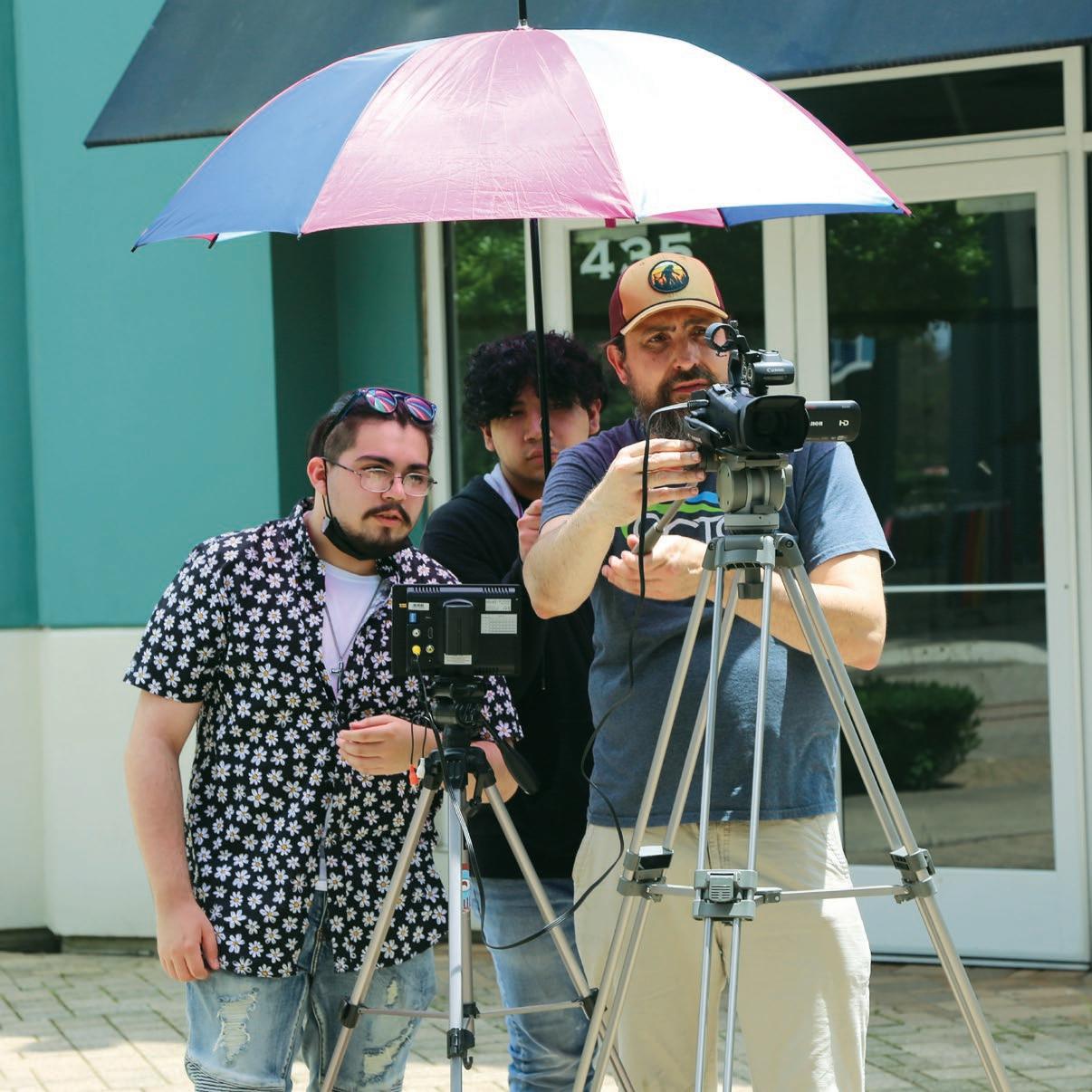
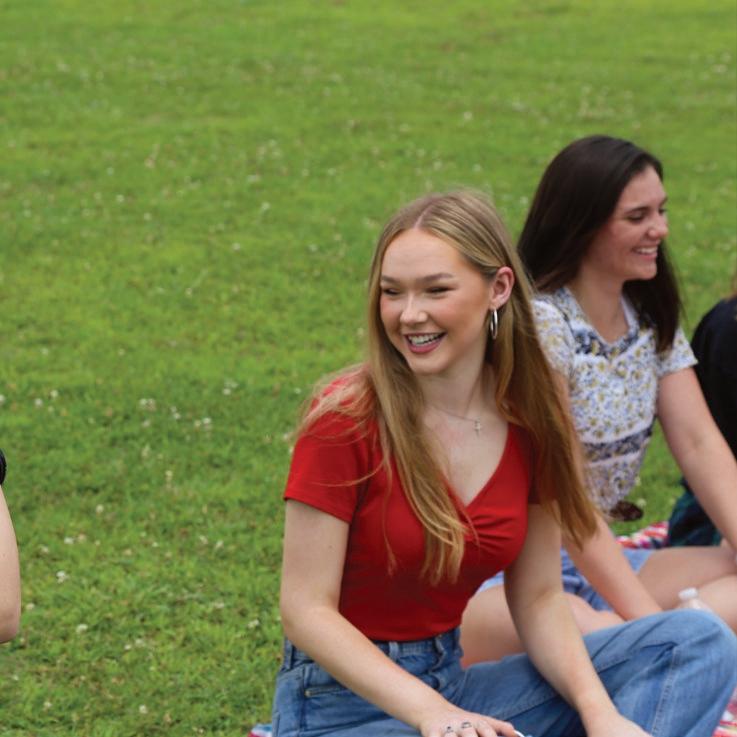
“The CDC recommends everyone age 5 and older get vaccinated as it is our best tool to protect everyone from severe illness and death due to COVID-19,” says Dr. Vanchiere, Associate Director of the Center for Emerging Viral Threats. “We have seen vaccination rates among teens and young adults increase over the past several months, but there is still work to be done in getting the message out. We need to reach this group in ways that are creative and impactful to them, which is how we came up with the vision to work together with Gregory [Kallenberg] and the Film Prize Junior team to have this talented group of students create public service announcements about the safety and importance of vaccines that speak to and are relatable to their peers.”
“We were so honored when LSU Health Shreveport approached us with the opportunity to showcase these incredibly talented young filmmakers,” says Gregory Kallenberg, Founder and Executive Director of Prize Foundation. “Through the PSAs, these filmmakers were able to address fears and hesitancies around vaccinations, using their voices and experiences to speak directly to their peers and the greater community about this important issue. The work they’ve done is to be applauded.“
All of the Film Prize Junior PSAs can be viewed at www.lsuhs.edu/covid19 and www.filmprizejr.com, as well as the LSUHS and Film Prize Junior Facebook Pages.
BioTech Company Founded by LSUHS Professor & Postdoctoral Fellow Wins 2021 Louisiana Startup Prize
Arganum Transplant Solutions was named the winner of Louisiana Startup Prize 2021: Focus on Health. Founded by J. Steven Alexander, PhD, Professor of Molecular and Cellular Physiology at LSU Health Shreveport, and Ricardo Costa, PhD, Postdoctoral Fellow at LSU Health Shreveport, Arganum Transplant Solutions aims to transform the organ preservation market by providing a method to convert ‘marginal’ donor organs into ‘acceptable/optimal’ organs by preventing post-implant inflammation which causes transplantation failure, called ‘delayed graft failure’.
Arganum Transplant Solutions was one of four finalists for this year’s Startup Prize, which focused on health and health innovation startup companies. To qualify for the finals, entrepreneurs needed to have a healthfocused business, such as a medical or surgical device, therapeutic, health technology, health service, or drug research, and attend one of the Mentor Events. Dr. Costa, CEO of Arganum Transplant Solutions, and Dr. Alexander, President of Arganum Transplant Solutions, presented their final business plans and pitch to the Startup Prize panel of judges December 10-12. As the winner of the competition, they receive $10,000 cash and a variety of professional services to further expand their company.
NEW TECHNOLOGIES ADDED TO RESEARCH CORE FACILITY
10X Genomics Chromium Controller for Single Cell RNA Sequencing Applications
RNA sequencing (RNA-Seq) is a powerful technique that utilizes next generation sequencing to better help researchers understand which genes are expressed, and in what quantities, within a population of cells at the time they are captured. Traditional bulk RNA-Seq methods analyze thousands to millions of cells at one time and provide only an average gene expression level for all cells combined, masking sample diversity and unique cell populations. While this might be sufficient to answer some research questions, greater resolution is often needed. To address this limitation, 10X Genomics developed single cell RNA sequencing (scRNA-Seq) methods that enable gene expression analysis of individual cells.
The 10X Genomics Chromium Controller is key to the scRNA-Seq workflow. It uses advanced microfluidics to partition single cells into droplets containing barcode sequences that identify the cell of origin and reagents that lyse the cell and transcribe the released RNA into DNA. DNA libraries are sequenced, and downstream analysis provides gene expression information for each individual cell, allowing researchers to precisely determine the different cell types and subtypes and how they differ within a sample. This can be an important approach for cancer biology, for example, as tumors are intricately composed of multiple cell types. Gaining a better understanding of these types and their gene expression patterns can lead to more effective treatments.
Thermo Scientific™ Orbitrap Exploris™ 480 Mass Spectrometer
The Mass Spectrometry Core in the LSU Health-Shreveport Research Core Facility is to provide efficient and cost-effective proteomics- and metabolomics-based services for research investigators. Thermo Fisher Thermo Scientific™ Orbitrap Exploris™ 480 Mass Spectrometer is a quadrupole-Orbitrap™ mass spectrometer which provides high-resolution, accurate-mass (HRAM) data, generating incredibly high-resolution measurements of up to 480,000 FWHM at m/z 200. The following is its unique technical specifications:
■ Mass range: 40 - 8000 m/z
■ Quad isolation: down to 0.4 u
■ Scan rate MS2: up to 40 Hz
■ Max resolution: 480k at m/z 200
■ Dynamic range: > 5000:1
■ Mass Accuracy: 3 ppm RMS ext., 1 ppm RMS int.
■ Dissociation: Higher energy Collisional Dissociation (HCD)
■ Analyzer: Quadrupole, Orbital
The Thermo Fisher Orbitrap Exploris 480 is the only Mass Spectrometer that can utilize the TMT 11 Plex tagging system that is designed to enable identification and quantitation of proteins in the different samples. In addition, Thermo Fisher Orbitrap Exploris 480 is combined with Thermo Scientific™ UltiMate™ 3000 RSLCnano System and HPG-3200RS PUMP, which has a wide flowpressure footprint with nano-, capillary-, micro-, and regular-flow options. In summary, it is a unique instrument designed for a wide variety of experiments with the highest performance and meets our analytical need for qualitative proteomics, quantitative proteomics and metabolomics.
The Research Core Facility at LSU Health Shreveport provides investigators, post-doctoral fellows, and graduate and undergraduate students with access to a wide variety of research services, educational and training opportunities, and state-of-the-art technologies. LSUHS investigators, as well as those associated with other campuses, are welcome to utilize any of the RCF’s technologies on a nominal fee-for-service basis. To learn more, visit lsuhs.edu/research/research-core-facility.
Local Business Leaders Support Center of Excellence for Emerging Viral Threats with $1.2 Million Gift
Dewey and Gigi Corley through their Chaparral Foundation, together with Margaret Place Properties, Inc., Frances and William Comegys, III, and the Family of Aaron and Peggy Selber, committed a combined $1.2 million to establish the first endowment for LSU Health Shreveport’s Center of Excellence for Emerging Viral Threats (CEVT). This is the largest private gift in the CEVT’s history. The group presented the gift to leadership of the CEVT and LSU Health Shreveport at a press conference on January 20. Through this historic gift, the group hopes to encourage others to support the CEVT’s work and mission.
“These gifts will provide fundamental support for the CEVT for years to come as we continue to address the public health needs of the North Louisiana region and beyond,” said Chris Kevil, PhD, LSU Health Shreveport’s Vice Chancellor for Research. “Support through gifts like this enhance our capability to address current and future viral threats and elevate LSU Health
Shreveport’s position as a national leader in viral research.”
“As confident as I was in our ability to stand-up a first-class lab to process COVID-19 test samples, I could never have envisioned the wide-scale impact of our services. I will be forever grateful to our lab staff, strike teams and LSUHS leadership for their early and continued support allowing us to grow and now be on the cusp of moving into a BSL3 lab in in 2023,” stated Andrew Yurochko, PhD, Executive Director of the Center of Excellence for Emerging Viral Threats.
“On behalf of the entire COVID-19 Strike Team, I am thankful for these community leaders who recognize the important work being done by the CEVT,” said John Vanchiere, MD, PhD, Associate Director of the CEVT and Director of the LSUHS COVID-19 Strike Team. “This gift will allow for the CEVT’s continued success in combating COVID-19 and serving the community.”
Dewey Corley, local businessman and
RoyOMartin, Roy O. Martin III and Kathy Martin Give $3.5 Million to Achieve
Top Capital Priorities on Three LSU Campuses
long-time supporter of LSU Health Shreveport stated, “We are proud to support the important work being done right here in Shreveport at the CEVT. Since the beginning of the pandemic, the scientists at LSU Health Shreveport have remained committed to serving this community, and we hope this gift demonstrates how grateful we are for every member of the CEVT for their dedication and expertise.”
Bill Comegys, president of the local non-profit group, Margaret Place Properties, Inc., shared, “We are excited for the opportunity to support the CEVT at LSU Health Shreveport. The CEVT has become a vital resource for our community and its citizens, and we are proud to aid in its continued growth.”
For more information about the CEVT and giving opportunities, visit www.lsuhsfoundation.org/cevt

LSU Alumni Roy O. Martin III and Kathy Kilpatrick Martin have made a $500,000 gift to LSU Health Shreveport’s Center for Medical Education. The Martins’ gift, together with RoyOMartin, is part of a $3.5 million gift supporting top capital priorities for three LSU campuses. The Martins’ gift will be directed to the Center of Excellence for Emerging Viral Threats (CEVT). The CEVT, created in March 2020 in rapid response to the effects of COVID-19, will be relocated to the top floor of the Center for Medical Education to address current space constraints, allowing the lab to become a Biosafety Level 3 (BSL-3) Lab – a critical advancement toward enhancing research capability to respond to future viral threats. The Kathy and Roy O. Martin III CEVT Training Lab will be named in their honor and will be a specially equipped facility allowing students and fellows to be trained by LSU Health Shreveport scientists to conduct crucial research required to address current and future viral threats. The Martins’ investment in this lab will be central to establishing the Shreveport-Bossier region as an attractive location for biotech investment long-term.
1501 Kings Highway PO Box 33932
Shreveport, LA 71130-3932
Nonprofit Organization
U.S. Postage PAID
Shreveport, Louisiana
Permit No. 4
